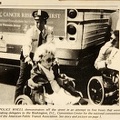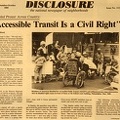The Washington Post, Friday, September 28, 1934
PHOTO (by Harry Naltchayan, The Washington Post): Three men in wheelchairs (left to right - Claude Holcomb, Bob Conrad, and Mike Auberger) discuss something as they block two Metro buses sitting next to each other.
Caption reads: Handicapped demonstrators block Metrobuses on Pennsylvania Avenue NW.
[Headline] Buses Captured In Demonstration By Handicapped
By Ronald Kessler, Washington Post Staff Writer
A dozen handicapped protesters, some in wheelchairs and others walking with crutches or canes, stopped rush-hour traffic in front of the White House yesterday by "capturing" seven Metrobuses.
The hour-long protest was aimed at demonstrating the lack of access to buses that handicapped persons endure both locally and nationwide.
The demonstrators agreed to release the buses—by abandoning their position in front of the vehicles—only after Metro General Manager Carmen E. Turner agreed to meet with them.
The demonstrators. representing a national group called American Disabled for Accessible Public Transit, said they wanted all new Metrobuses to be equipped with power equipment that lifts wheelchairs into buses. AIso, they said, they want the Department of Transportation to allocate more funds for equipping buses nationwide with the lifts.
"We say it's a civil right, just as they denied black people the right to get on a bus and now allow them access." said Mike Auberger of Denver, a spokesman for the group. “It's a right like being able to go to school."
Presently, Metro schedules a limited number of runs with buses equipped with lifts, or dispatches the buses if a handicapped person requests on the day before.
The protesters said a lift costs $8,000 on a $180,000 new bus. an amount they said is far below the cost of an air conditioner. "I’ve called for buses, and they break down said Ronald L. Smith, who sat in a wheelchair in front of the Old Executive Office Building. "We want all the buses to be for the handicapped."
Beverly Silverburg, director of public affairs for Metro, said last night that the group will meet with Assistant General Manager Theodore Weigle and Turner "will probably meet with the group."
The protest began at 1:15 p.m., when the demonstrators announced to reporters that they were going to surround the next bus that stopped in front of the White House. It happened to be one marked "Brookland."
Several demonstrators lay down on the street or leaned against the front of the bus while supporting themselves on crutches. A second contingent blocked another bus that had just pulled up behind the first.
"What's going on?" Theodore R. Wright, the driver of the Brookland bus, said to no one in particular.
The protesters told him they wanted to meet with Turner to present their grievances.
As riders disembarked, Wright called his dispatcher. "I'm looking at two buses that are blocked," he said "They want Carmen Turner."
Wright said he once drove a bus equipped with a power lift for six months and never had a handicapped rider. But he added, "l sympathize with these people. Probably they have some legitimate beefs."
As the impasse dragged on, the protesters took over a third bus as it was trying to pass the first two. Police persuaded the protesters to let it go, but they became more agitated and began blocking buses across the street in front of Lafayette Square.
By 5 p.m., police had cordoned off the section of Pennsylvania Avenue NW in front of the White House, disrupting rush-hour traffic in all directions. Metro supervisors came and went, and one protester was taken to George Washington Hospital after he fell off his wheelchair.
By 5:30 p.m., the protesters had corralled seven buses, would-be passengers were complaining that they could not find a bus, and bus drivers were lining the streets.
At 5:35 pm., D.C. Police Lt. W.R. Sarvis passed the word that Turner had agreed to the meeting. The demonstrators uttered whoops of joy and hugged each other.
“No confrontations, no problems," said Sarvis.
The protesters said they also plan to present their demands to the American Public Transit Association, which meets here Sunday.
- Created on
- Thursday 11 July 2013
- Posted on
- Wednesday 25 November 2015
- Tags
- 24 hour advanced reservation, ADAPT - American Disabled for Accessible Public Transit, blocking a bus, Carmen Turner, civil rights, lack of access, lifts on NEW buses, meeting, police, protest, Ronald Smith, White House
- Visits
- 2694
- Rating score
- no rate
- Rate this photo


0 comments